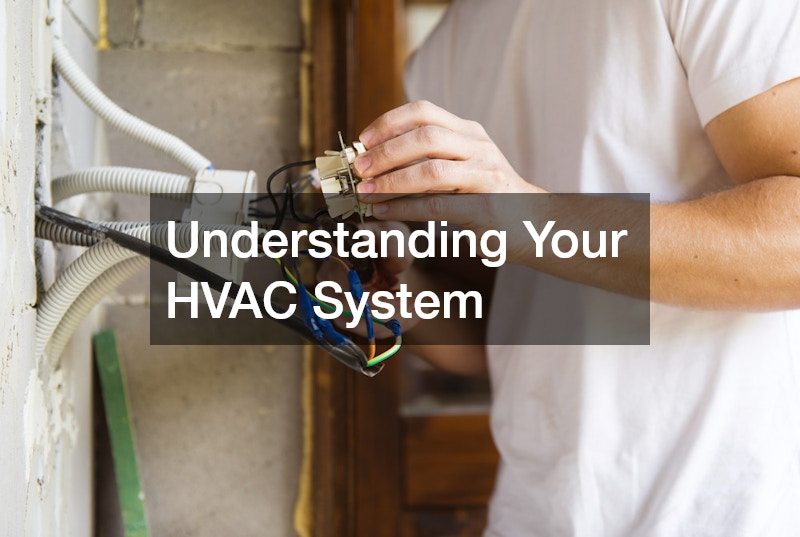As the seasons change and temperatures start to drop, it’s essential to ensure that your HVAC system is in top working condition to keep your home comfortable. Fall is the perfect time to perform maintenance tasks that will help your system run efficiently during the cooler months ahead. In this article, we will discuss some important fall HVAC tips to keep your system running smoothly.
Understanding Your HVAC System

When it comes to HVAC repair, it’s important to have a basic understanding of how your system works. Your HVAC system consists of a furnace, air conditioner, and ductwork that work together to maintain a comfortable indoor temperature. Knowing how these components function can help you identify potential issues and troubleshoot minor problems.
Fall HVAC tips also include familiarizing yourself with your system’s thermostat settings and learning how to adjust them for optimal comfort and energy efficiency. Regularly checking and replacing air filters is another crucial aspect of HVAC maintenance to ensure proper airflow and indoor air quality.
Additionally, scheduling annual professional maintenance with a reputable HVAC company can help prevent costly repairs and extend the lifespan of your system. Professional technicians can inspect your system, identify any potential problems, and perform necessary tune-ups to keep it running efficiently.
Change Your Air Filters
One of the simplest yet most important fall HVAC tips is to regularly change your air filters. Clogged or dirty air filters can restrict airflow, reduce efficiency, and compromise indoor air quality. HVAC companies recommend checking your filters monthly and replacing them every 1-3 months, depending on your system and household’s needs.
Dirty filters not only make your HVAC system work harder and consume more energy but can also lead to system malfunctions and breakdowns. Changing your filters regularly can improve indoor air quality, reduce allergens, and help your system run more efficiently, saving you energy and money in the long run.
If you’re unsure about the type or size of filters your system requires, consult with your local heating service or HVAC professional for guidance. They can recommend the best filters for your system and show you how to replace them correctly to maintain optimal performance.
Clean the Condenser and Evaporator Coils
Regularly cleaning the condenser and evaporator coils of your air conditioner is essential for maintaining efficient cooling and heating performance. Over time, these coils can accumulate dirt, dust, and debris, hindering heat transfer and reducing system efficiency. Cleaning these coils in the fall helps prepare your system for the increased workload of the winter season.
Local heating services recommend using a soft brush or vacuum to gently clean the coils and remove any buildup. Be sure to turn off the power to your system before attempting any maintenance to prevent injury or damage. Cleaning the coils can improve airflow, reduce energy consumption, and prolong the lifespan of your HVAC system.
In addition to cleaning the coils as part of your fall HVAc tips, it’s important to check for any signs of damage or wear and tear that may require professional repair. If you notice any issues with your coils or other components of your system, contact your local HVAC service provider for prompt assistance.
Check and Seal Ductwork

Insulating and sealing your ductwork is one of many crucial fall HVAC tips to prevent energy loss and ensure consistent heating and cooling throughout your home. Leaky ducts can waste energy by allowing conditioned air to escape into unconditioned spaces, such as attics or crawl spaces. Properly sealed ductwork can improve comfort, indoor air quality, and energy efficiency.
AC repair services recommend inspecting your ductwork for leaks, gaps, or loose connections and sealing them with foil tape or mastic sealant. This simple task can help reduce energy bills, improve airflow, and extend the life of your HVAC system. Sealing ductwork also prevents dust, allergens, and contaminants from entering your living spaces.
If you’re unsure how to check or seal your ductwork as pa, consider hiring a professional HVAC technician to perform an inspection and make any necessary repairs. Local heating repair experts have the tools and expertise to identify and repair ductwork issues effectively, ensuring your system operates at peak performance.
Inspect the Thermostat
Your thermostat plays a vital role in controlling your HVAC system’s temperature and ensuring comfort throughout your home. Fall is a great time to inspect your thermostat for any issues, such as incorrect settings, dead batteries, or calibration errors. Regularly checking and adjusting your thermostat can help maintain energy efficiency and prevent unnecessary strain on your system.
Plumbing services recommend testing your thermostat by adjusting the temperature settings and observing how your HVAC system responds. If you notice any discrepancies or malfunctions, consider replacing the thermostat or consulting with a professional for repairs. Upgrading to a programmable or smart thermostat can also help optimize energy usage and comfort levels in your home.
In addition to checking the thermostat settings as part of your fall HVAC tips, ensure that the location of your thermostat is free from obstructions, heat sources, or drafts that may affect its accuracy. Regularly dusting and cleaning around the thermostat can also help maintain its functionality and accuracy.
Schedule a Professional Inspection
One of the most important fall HVAC tips is to schedule a professional inspection of your system before the winter season begins. Local heating repair technicians recommend having your HVAC system serviced annually to detect and prevent potential issues that could lead to costly repairs or breakdowns. Professional inspections can ensure that your system is operating safely, efficiently, and reliably.
During a professional inspection, HVAC technicians will check and test all components of your system, including the furnace, air conditioner, heat exchangers, electrical connections, and controls. They will also clean and tune up your system to maximize performance and efficiency. Regular maintenance can extend the lifespan of your system and improve indoor air quality.
If you haven’t scheduled a professional inspection for your HVAC system this fall, contact a reputable local heating service provider to book an appointment. Experienced technicians can identify any issues early on and recommend solutions to keep your system running smoothly throughout the winter.
Clean and Inspect Heat Exchangers

Cleaning and inspecting your heat exchangers is another essential fall HVAC tip to ensure safe and efficient operation of your furnace. Heat exchangers transfer heat from the combustion process to the air circulating in your home, and over time, they can become dirty or damaged, affecting system performance and indoor air quality. Cleaning and inspecting heat exchangers can prevent malfunctions and potential safety hazards.
Air conditioning services recommend visually inspecting your heat exchangers for cracks, rust, or other signs of damage that may indicate a potential issue. Regularly cleaning the surfaces of the heat exchangers can remove dust, debris, and soot buildup that can obstruct airflow and impede heat transfer. Keeping your heat exchangers clean can improve energy efficiency and prevent breakdowns.
If you’re unsure how to clean or inspect your heat exchangers safely as part of your fall HVAC tips, consider hiring a professional heating contractor to perform this task for you. HVAC technicians have the knowledge and expertise to identify and address heat exchanger problems to ensure your furnace operates safely and efficiently during the winter months
Clear Surrounding Areas
Keeping the area around your HVAC system clear and unobstructed is a one of many important fall HVAC tips to maintain proper airflow and ventilation. Dirt, debris, leaves, and other obstructions around your outdoor unit can restrict airflow, hinder system performance, and increase energy consumption. Clearing the surrounding areas ensures that your system operates efficiently and effectively.
Heating contractors recommend trimming any vegetation, bushes, or trees near your outdoor unit to allow for adequate airflow and prevent debris buildup. Regularly removing leaves, twigs, and other debris from around the unit can also help prevent clogs and airflow restrictions. Keeping the area clear of obstructions can prolong the lifespan of your system and reduce the risk of malfunctions.
In addition to clearing the area around your outdoor unit, ensure that indoor vents, registers, and air intakes are unblocked and free from obstructions. Proper airflow throughout your home is essential for maintaining comfort, indoor air quality, and system efficiency.
Test the System
Before the weather gets too cold, it’s a good idea to test your HVAC system to ensure that it’s working properly and efficiently. Plumbing contractors recommend turning on your heating system and setting the thermostat to engage the furnace. Listen for any unusual noises, smells, or malfunctions that may indicate a problem with your system.
If your HVAC system isn’t heating your home effectively or if you notice any issues during testing, contact a local heating repair technician for prompt assistance. Delaying repairs or maintenance can lead to more extensive problems and higher repair costs down the line. Testing your system early in the fall allows you to address any issues before the winter season begins.
Regularly testing your HVAC system as part of your fall HVAC tips can help you identify and resolve issues quickly, ensuring that your system operates efficiently and reliably throughout the colder months. Monitoring your system’s performance and addressing any concerns promptly can help prevent breakdowns and ensure uninterrupted comfort in your home. Additionally, keeping a maintenance log of any repairs or adjustments can provide valuable insights over time, making it easier to spot recurring issues and optimize your system’s efficiency as seasons change. This proactive approach will ultimately save you time, money, and stress during the winter.
Insulate Your Home
Insulating your home is one of many key fall HVAC tips to improve energy efficiency, reduce heat loss, and lower heating costs. Proper insulation helps maintain a comfortable indoor temperature, reduces strain on your HVAC system, and enhances overall comfort in your home. Insulating your walls, floors, ceilings, and attic can prevent heat transfer and save energy.
Local plumbers recommend checking for drafts, gaps, or leaks around windows, doors, and other openings in your home and sealing them with weatherstripping, caulk, or insulation. Adding insulation to your attic and walls can also help regulate indoor temperatures and improve energy efficiency. Proper insulation not only reduces energy bills but also enhances indoor comfort and air quality.
If you’re unsure how to insulate your home effectively, consider consulting with a local contractor or professional insulation service for guidance. They can assess your home’s insulation needs, recommend the best solutions, and ensure that your home is properly insulated for maximum energy savings and comfort.
Monitor Energy Usage

Monitoring your energy usage is one of an important fall HVAC tip to help you identify opportunities for energy savings and efficiency improvements. Tracking your heating and cooling costs can help you understand your HVAC system’s energy consumption patterns, adjust your usage habits, and implement energy-saving strategies. Monitoring energy usage can also help you identify potential issues with your system.
By using smart thermostats or energy monitoring apps, homeowners can gain real-time insights into their energy consumption. These tools often provide detailed reports that highlight trends, allowing you to pinpoint times of excessive use or identify spikes in energy bills. This information can empower you to make informed decisions, such as adjusting thermostat settings during off-peak hours or scheduling maintenance when you notice unusual consumption patterns.
Additionally, consider conducting an energy audit of your home. This process can reveal areas where you may be losing heat or air conditioning, such as drafty windows or poorly insulated spaces. Many local utilities offer free or discounted energy audits, which can provide tailored recommendations for improving your home’s energy efficiency. By taking these steps, you can maximize the efficiency of your HVAC system and enjoy lower utility bills while maintaining a comfortable indoor environment.
Fall is the perfect time to perform essential maintenance tasks to prepare your HVAC system for the colder months ahead. By following these fall HVAC tips, such as changing air filters, cleaning coils, inspecting ductwork, and scheduling professional maintenance, you can ensure that your system operates efficiently, reliably, and safely. Regular maintenance not only extends the lifespan of your HVAC system but also improves energy efficiency, indoor air quality, and comfort in your home. Remember to monitor your energy usage, test your system, and insulate your home to maximize energy savings and comfort throughout the fall and winter seasons.
